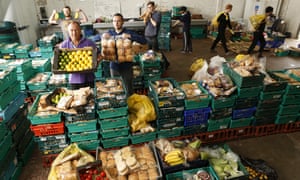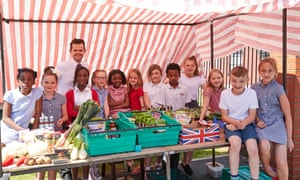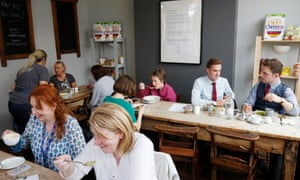The
Real Junk Food Project: revolutionising how we tackle food waste
The Real Junk Food Project started in Leeds and has grown into a
global phenomenon. Its mission? To end food waste (and help local schools along
the way)

Keith
Annal (front left) and other Real Junk Food Project team members at its food
rescue warehouse in Leeds. Photograph: Murdo Macleod for the Observer
Sunday 18 September
2016 06.30 EDT
Adam Smith is blunt and to
the point when I call him to suggest an interview. I want to talk to him about
the Real Junk Food Project, which he founded, and suggest doing it at the cafe
he set up in Leeds which uses waste food and operates on a pay-as-you-feel
basis. “Which cafe? There are 30 of them. And that’s just in Leeds.”
Bluntness may well be Smith’s defining characteristic. A chef by
training, who had, by his own admission, a troubled childhood, he set up the project only three years
ago, and it’s been a roller-coaster ride since then. He reels off
some statistics. “We’ve got a 6,000-square-foot warehouse just here in Leeds
and we’re intercepting between two and 10 tons of food a day. It’s just gone
crazy. There are 125 Real Junk Food cafes worldwide now, not just in Britain,
but in Israel and Australia and we’re about to launch 16 of them in America.”
And, no, he doesn’t have time to do an interview. “It’s really
not about me,” he says. “I haven’t even met half the people who’ve set up the
cafes. It’s much bigger than me now.” It is pretty big, it’s true, but I go up
to Leeds anyway and, in the warehouse, it becomes more obvious why the project
has taken off so dramatically. There’s a mountain of food. Marks & Spencer
cakes and Ferrero Rocher chocolates and punnets of grapes and tomatoes and posh
crisps and jars of olives and out-of-date bottles of that well-known easily
perishable food substance – water – and down one aisle, dozens of clear plastic
bin liners all filled with bread.
“It’s the bane of our lives, bread,” says Keith Annal, the
operations manager. “The supermarkets make so much of it. And then they chuck
out so much of it.”
There are rolls and baguettes and bagels and croissants. There’s
poppy seed bread and granary bread and ciabatta and sliced white. They try to
give away as much of it as they can but it’s a challenge. Annal points to the
van outside. “I’ve filled that twice already today. I got 22 boxes of fruit and
veg from Morrisons – that’s just three days’ waste from one supermarket.”
And it’s all perfectly good food, which if they hadn’t rescued
it would now be rotting at the bottom of the bin. “Look at those bananas,” says
Annal. “Nothing wrong with them.” But then there doesn’t seem to be much wrong
with any of it, apart from the fact that it’s packaged, and everything in a
package has either a “use by” or a “best before” date.
It’s certainly eye-opening seeing how much is coming out of a
handful of supermarkets in one mid-sized British city. Leeds is just the start.
The beginning, Smith hopes, of a global movement: to end food waste. Because,
at the moment,we throw away 15 million tonnes of food
a year, more than any other country in the EU, even those, like
Germany, which have a bigger population than us.
Smith’s response has been to invent the concept of a Real Junk
Food cafe. Send off for a welcome pack, sign an agreement and then feed people
waste food. The only rules are that you must feed everyone, not just poor
people, and customers should only pay what they feel the meal is worth. If they
have no money, they can volunteer labour and skills instead. Because the project
has done deals with certain supermarket chains – Sainsbury, Morrisons, Ocado –
at a national level, the food is there, ready for the taking.
At the back of the warehouse scanning the shelves for produce is
Duncan Milwain. He’s the partner in a law firm but got involved when he
received an email from Smith asking for legal help setting up the company. He
did that but then found himself being drawn in. “When I began to see the volume
of waste coming in, I just thought it was obvious that something had to be
done.”
Two years ago, Milwain gave up a day a week at his job and
opened the Saltaire Canteen, a Real Junk
Food cafe in the upmarket town of Saltaire, a world heritage site and home to
one of the largest collections of David Hockneys in the world. “Some people
were convinced we should be feeding the poor, not serving cake in the posh part
of town, but it’s about food waste, not poverty per se.”
Though there is poverty too. I hop in the van with Annal and
boxes of cakes and bags of potatoes and loaves of bread and head off to
Parklands Primary School in Seacroft. It’s one of the most deprived parts of
Leeds and it’s been one of the first schools to sign up to a new initiative the
Real Junk Food Project is pioneering called Fuel for School.
First, there’s what the headteacher, Chris Dyson, calls “Funday
Friday!”, or a lively assembly involving karaoke-ing along to Take That and a
fiendishly difficult times table competition. There are stars and certificates
for the children and then, at the end, they and their families file out and
there are five tables laden with food, free for anyone to take, in exchange for
a small donation if they have it and nothing if they don’t. It has the rather
grand title of a “food boutique” but it’s making use of food that would
otherwise go in the bin.
“We love it,” says Dyson. “Some parents were a bit proud at
first but now they’re piling in. We never shut. We come in, in the holidays, to
do this. There are families for whom it’s a continuous struggle. They get
access to food banks but that’s only three times a year. It’s brilliant to be
able to provide a bit extra.”

Pupils
from Richmond Hill Primary School, Leeds, with their headmaster Nathan
Atkinson. Photograph: Chris Floyd for the Observer
Richmond Hill Primary, in another deprived bit of Leeds, is just
a few miles away. Its head, Nathan Atkinson, took over in 2014 and, while he
says it’s “an amazing place” with pupils speaking 48 languages, nothing he
tried seemed to be working. I’ve followed him from Seacroft, where he took part
in the assembly, to Wigan, where he’s speaking to a room full of headteachers.
“I’d been in vulnerable schools, schools in special measures,” he tells them,
“but when we tried the same things here, they didn’t work. We had good
teachers, a good curriculum, but we realised the children weren’t in a place
where they were ready to learn.
“It came to a head after one half-term, their behaviour was just
atrocious, and we realised some of them hadn’t had a hot meal in a week.” The
first thing he did was to buy toasters for every classroom, “but then I needed
food. I’d met Adam by chance and I said, ‘Why don’t you open a junk food cafe
in the school?’ He was like, ‘No thanks. But you can do it.’”
Richmond Hill, he explains, is a “food desert” – it’s impossible
to buy fresh fruit and veg in the postcode. But half a mile away, it turned out
was one of Leeds biggest wholesalers. “We jumped in the school minibus and
straightaway they gave us 27 boxes of bananas and ten boxes of cucumbers.”
The school now provides breakfast every
day to 650 pupils, has its own cafe and a weekly “food boutique”. It has
improved punctuality and attendance and helped build bonds between the parents
and the school, he says. To showcase what was possible, he and the Real Junk
Food Project fed 10,000 children across Leeds on one day last autumn, entirely
with waste food. “We want to make food available to children,” he says. “It’s
so simple. Yet it’s tragic that we have to do this.”
The teachers in the room nod their heads thoughtfully. They’ve
been invited by Ann Fairhurst and Shirley Southworth, who’d heard of Smith’s
success and decided to set up their own Real Junk Food cafe in Wigan. It’s
called Fur Clemt – Wigan-ish for “I’m starving” – and when a friend of theirs
told them about children going into school hungry, they decided to set up a
Fuel for School too.
They’re another incredibly dynamic duo. They both have full-time
jobs but set up the cafe in a community centre owned by the Wigan Warriors
rugby league team and have become expert at sourcing fresh food from suppliers
in the local area. The Real Junk Food Project has been supportive, but they’ve
largely done it themselves. As have Save the Date in Dalston, east London, Curb
Kitchen in Southampton, the Trash Cafe Network in Gosport … the list goes on.
In one afternoon, I’ve met half a dozen inspiring people who
have taken Smith’s idea and run with it. Sometimes it’s hard to know what
drives people but for some reason a mountain of perfectly good food that’s
destined to end up rotting seems to have done the trick.

Customers
at the Saltaire Canteen, Saltaire, Yorkshire, one of the many Real Junk Food
cafes nationwide. Diners pay whatever they feel the food is worth. Photograph:
Murdo Macleod for the Observer
The Saltaire Canteen is as attractive and tastefully
appointed as Saltaire itself. It’s a handsome Victorian model village and the
cafe has big plate glass windows, discreet branding in shades of grey, scrubbed
pine tables and a small notice explaining the pay-as-you-feel concept. I’ve
just missed lunch but I chat to Katie and Michael Tonks from Sheffield who are
polishing off their croque monsieur, salad and what they describe as “posh
chips”.
How was it? “Delicious. I’m impressed. I’m always getting
confused by the difference between ‘use by’ dates and ‘best before’ and I
sometimes worry if I’ve got something in the fridge that’s a few days out of
date.”
I’m here because, after a month or so of phone calls, texts and
emails, I’ve finally pinned down Smith. He turns up with his young son, Joshua,
and the words that no interviewer who’s travelled 200 miles wants to hear,
“I’ve only got 15 minutes.” He softens up when we actually start talking but
it’s calling a spade a spade that has probably got him as far as he has.
There’s no doubting his anger for what he considers “criminal levels of waste”
and, though it was a video on the Guardian website that gave the Real Junk Food Project its
first proper blast of publicity, he’s reluctant to do anything that might be
construed as courting the press. He declined to be photographed for this piece.
“There’s just so much going on. I’m totally overwhelmed. I said
right from the beginning that I wanted to feed the world and I haven’t even
started yet. We’ve fed nearly half a million people in 30 months but there’s so
much more we can do.” But the pace of growth has been exhausting. “I’ve just
got off the phone with people in the South Korean government, because we’re
launching there. I get emails all the time from all over the world. Yesterday,
in the space of about three minutes, we had emails from Indonesia, Spain,
Canada, and Loughborough. It’s non-stop.”
Why has it captured people’s imaginations?
“There’s nothing complex about it. It makes sense. It’s
sustainable. And it’s the right thing to do. I think that’s why people get
inspired. It’s something they can do. If some kid from Leeds can do it, they
can. I’ve been in prison, I was in care, I’ve been in mental health homes. I
was on drugs and alcohol. I was found nearly dead in a car from a suicide
attempt.
“It’s about empowering people to change their own lives and when
you do that, that’s when a movement happens, and in the space of two years
we’ve had thousands of people around the world standing up and doing stuff.”
The idea came to him while he was working as a chef in
Australia. He’d worked his way up to head chef, on a big salary, in Melbourne,
working all hours. And then, to extend his visa, he’d gone to work for a few
months on a farm. “It was February 27, 2013 and I’d just seen the farmer get a
delivery of a tonne of courgettes, freshly picked, that he was feeding to his
pigs. I said, ‘Why don’t you just give this to charity?’ And he said, ‘I just
don’t have the cost and logistics to get it where it needs to go.’ That’s when
it came to me.”
He returned to the UK, set up the first cafe in Armley, Leeds,
often going skip-diving outside supermarkets to get ingredients, and for the
first two and a half years, during which time his son was born, he didn’t even
take a wage. He was living off £92-a-week tax credits. And, though he’s
persuaded many of the supermarkets to work with him, he’s still angry about
what he sees them doing: the waste that seems to be built into the system.
“I’m sick to death of the media and supermarkets who say it’s
all to do with consumers. It’s nothing to do with them.
We didn’t want this saturation of supermarkets on our high street selling food
24 hours day, manipulating us into purchasing more.”
France has recently introduced a law that bans supermarkets from
destroying unsold food. They have to give it to charity, or face a fine. It’s a
prime example of the kind of thing Smith believes ought to be introduced here
but is bound up in exasperating bureaucracy.
“I’m fed up being invited to Westminster and wasting my time
with people who are creating targets for 20 years’ time. It needs to happen
now, on a local level. I think a lot of it is about grassroots education.
There’s a huge demographic of people who are completely uneducated about food.”
Meanwhile, Joshua has picked up an old-looking satsuma from the
window display and put it in his mouth. There’s no ‘Joshua! Joshua! Put it
down,’ from Smith though. “Are you going to eat the skin as well?” he asks him.
Joshua starts eating the skin. “OK, well, your choice. Let’s see how you get on
with that. You won’t do it again if you don’t like it, will you?” People are so
fearful of food, he says. “Eighty people died from food poisoning last year,
whereas 75 were hit by lightning. We’ve probably got the safest food ever. It’s
about getting people to understand food.”
Then, to Joshua, “Have you finished that?” He has, skin and all.
He’s gnawing on a rock-hard stale loaf instead. The next generation of junk
food pioneers in action.
No comments:
Post a Comment